Winter 2024 viewing, part three: Other labels
In addition to the Severin and Vinegar Syndrome titles mentioned in my previous two posts, I’ve recently watched a couple of dozen disks from a range of other companies, with the emphasis still largely on genre releases. Several of these came via my regular orders to Vinegar Syndrome as they continue to expand the number of smaller labels they handle.
VS Partners
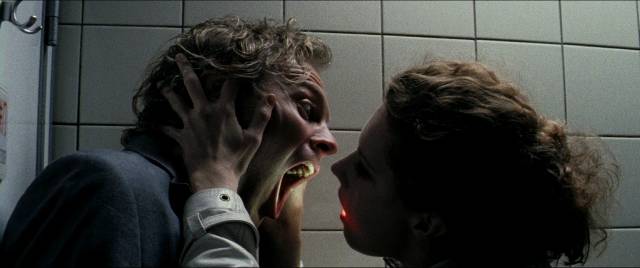
Luz (Tilman Singer, 2018)
Tilman Singer’s Luz (2018) is a short (70-minute) feature made as his film school thesis project. That origin may not be surprising – the stylistic play on display indicates a filmmaker flexing his creative muscles within a context of limited resources but little outside control. Shooting in widescreen (2.40:1), with an emphasis on precise formal framing, often in long-held shots within which there’s little movement, Singer creates a sense of tension from anticipation rather than overt action. A silent woman enters an almost deserted, ultra modern office which turns out to be a police station, eventually being interrogated by a pair of detectives; her story unfolds in both a kind of pantomime reenactment in the interrogation room and actual dramatizations of the events which have brought her here in a state of shock. She’s a Chilean immigrant, working as a cab driver in a German city, who apparently has been pursued by a demon since her school days, a malevolent force which appears to be romantically infatuated with her as it takes serial possession of people with whom she comes into contact – including the officer questioning her. Visually elegant, eerie, and growing progressively more menacing, the film displays Singer’s technical skills and confidence, benefiting from a good cast and the excellent cinematography of Paul Faltz. (Altered Innocence Blu-ray, with a director interview and two short films)
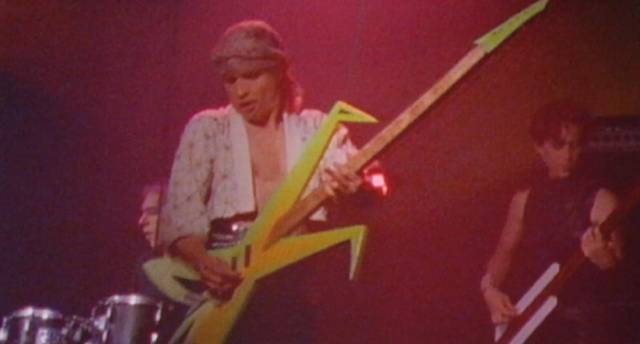
Shredder Orpheus (Robert McGinley, 1990)
Robert McGinley’s Shredder Orpheus (1990) is one of those oddities which you would never have imagined before seeing it, but once you have it seems strangely apt. Made by members of the Seattle music and skating scene, it offers a surprisingly faithful version of the Greek myth of Orpheus and Eurydice and the power and limitations of music to shape existence. In a post-apocalyptic wasteland, rock star Orpheus (McGinley himself) loves dancer Eurydice (Megan Murphy). Living in a ragged community where the underclass occupy freight containers, skating and making music while society succumbs to the hypnotic, brain-controlling television signal from the Euthanasia Broadcast Network run by Hades (Gian-Carlo Scandiuzzi) in the Underworld, the lovers are doing just fine until Hades’ sees Eurydice and decides he needs her for his show. When she’s grabbed, Orpheus has to find his way into the Underworld, his magical instrument gaining him access. Somehow, McGinley blends all the disparate elements – music, skateboards, sci-fi, myth, romance, comedy and a critique of Capitalism’s degradation of culture – into a coherent whole, propelled by a score and songs provided by leading members of Seattle’s counterculture. Shredder Orpheus is one-of-a-kind, appropriately scrappy on AGFA’s Blu-ray, which includes a director commentary, a brief cable access clip, and a VHS transfer of the feature for comparison.
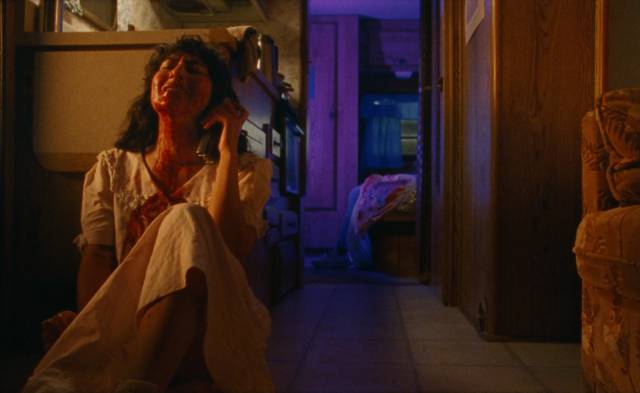
The Runner (Jae Matthews & Augustus Muller, 2022)
The Runner (2022) is a short feature (only 41-minutes), also made by musicians, but referencing movie tropes rather than ancient myth. I hadn’t previously heard of the band Boy Harsher, but a quick sampling of their music was enough to make me take a chance on this disk. The electronic sound of Jae Matthews and Augustus Muller is reminiscent of ’80s soundtracks by the likes of John Carpenter, an impression reinforced by the film’s imagery – it begins with a traumatized, bloodied woman (Kris Esfandiari) running through woods, echoing many a slasher movie; we gradually get hints about her and what’s brought her here, but this minimal, elliptical narrative is intercut with the band recording the music in a studio, along with occasional music videos glimpsed on television screens. This is less a movie than a concept album video like Richard Stanley’s Brave (1994) for the Marillion album or Ray Davies’ Return to Waterloo (1984). I liked the music, but found the under-developed narrative a bit frustrating. The image on Yellow Veil’s Blu-ray is fine, the audio supporting the music well; there are a commentary and interview with Matthews and Muller, three music videos and a collection of Matthews’ early shot-on-VHS experimental shorts.
*
Umbrella Entertainment
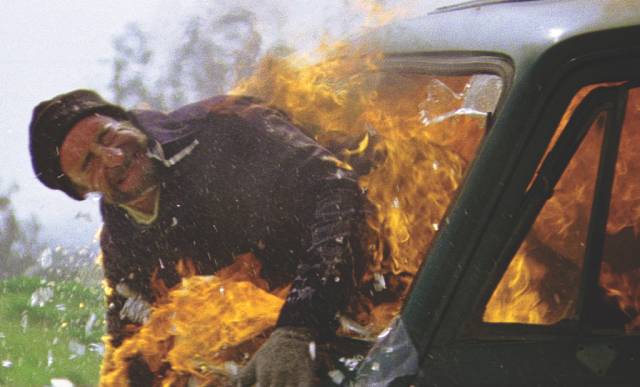
Stunt Rock (Brian Trenchard-Smith, 1978)
Brian Trenchard-Smith, born in England and transplanted to Australia, has had a successful forty-plus year career as an unapologetic exploitation filmmaker. He started in the early ’70s with television and documentary work which peaked with the terrific public service short Hospitals Don’t Burn Down! (1978), about the difficulty of evacuating a hospital when a careless patient starts a fire (it’s included as an extra on Arrow’s Dead-End Drive-In Blu-ray). Although he had made a successful transition to features with The Man from Hong Kong (1975) and Deathcheaters (1976), my first encounter with his work was several movies from the ’80s which I didn’t catch up with until the advent of DVD – Turkey Shoot (1982), BMX Bandits (1983) and Dead-End Drive-In (1986). Like many directors of his generation, he eventually moved to television and cheap cable movies – a glance at his filmography indicates that his only post-’80s work that I’ve seen is the pair of Leprechaun sequels he made in the mid-’90s: Leprechaun 3 (1995) and Leprechaun 4: In Space (1996). In the past decade or so, I’ve come to know him as the most engaging of the commenters on Trailers From Hell, where he always packs a great deal of information about a wide range of movies into a couple of minutes of well-researched background.
Now, thanks to Umbrella Entertainment and a friend’s recommendation, I’ve discovered a movie which displaces Dead-End Drive-In as my favourite Brian Trenchard-Smith feature.
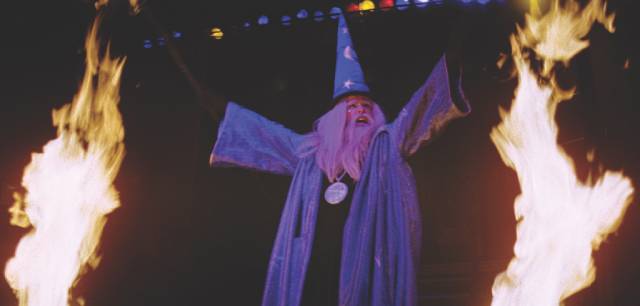
Stunt Rock (1978) is unclassifiable – part documentary, part concert film, part homage to legendary Aussie stuntman Grant Page. Trenchard-Smith not surprisingly has had a long-standing affection for stunt performers, having relied on their skills in so many action-oriented movies. In fact, his second directorial credit is for The Stuntmen (1973), a one-hour documentary about the craft, mixing dangerous stunts staged specifically for the doc with archival material going back to the silent days. Page was one of the featured stuntmen and he and Trenchard-Smith worked together many times in the ensuing years.
In Stunt Rock, Page plays a version of himself hired to work on a TV series in Hollywood – a spy show starring Dutch actress Monique van de Ven, best-known at the time as the star of a couple of early Paul Verhoeven films, who later co-starred in Dick Maas’ Amsterdamned (1988). In the States, Page looks up his cousin who plays in the rock band Sorcery and, in between performing dangerous stunts for the TV camera, he attends concerts with van de Ven and reporter Lois Willis (Margaret Gerard) who’s doing a feature on his work. The two threads finally come together with Page performing a hair-raising fire stunt on stage during the band’s show.
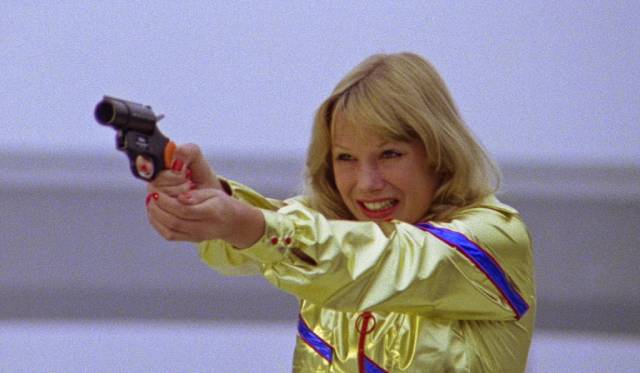
That show is elaborate and highly visual, involving an ongoing conflict between Merlin and Satan which includes some impressive stage magic to accompany the band’s music. The mixture of concert footage (nicely shot by cinematographer Bob Carras) and behind-the-scenes documentary footage showing how stunts are rigged and performed (along with archival footage of Page’s previous work, which includes material from The Stuntmen and features like Philippe Mora’s Mad Dog Morgan [1976], which involved a particularly dangerous fire gag) shouldn’t really work, but the inherent spectacle of the band’s shows and the engaging personality of Page himself somehow tie the disparate elements together into an exhilarating ode to performance itself, the business of show which inspires people to push against their physical limits for the entertainment of an audience. Page, by the way, now in his eighties, is still working – he has a credit in George Miller’s upcoming Mad Max prequel Furiosa.
Umbrella’s 4K restoration does a fine job with an uneven source (the archival material obviously looks rougher than the feature’s original footage) and the sound is fine, supporting Sorcery’s concert performances well. The disk is packed with extras – a pair of archival commentaries, a feature-length discussion between Trenchard-Smith and his wife Margaret about the production, multiple archival interviews, several Q&As with Trenchard-Smith, and a trailer reel spanning Trenchard-Smith’s career. There’s also a 16-page comic book adaptation of the movie.
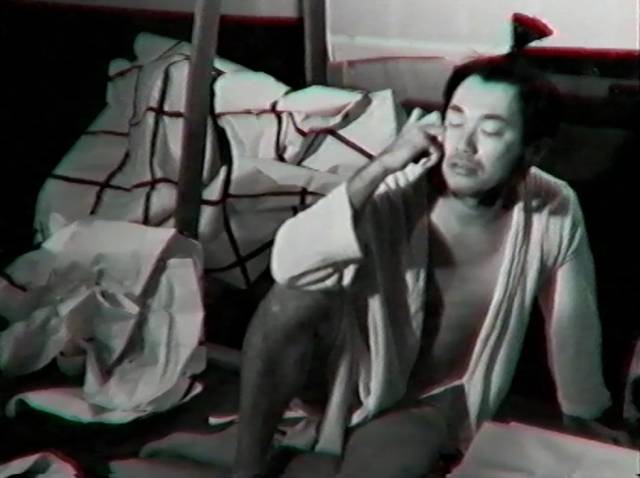
Top Knot Detective (Aaron McCann & Dominic Pearce, 2017)
Fake documentaries can be tricky. The better they are at disguising their fake-ness, the more likely they are to trigger a backlash against the filmmaker. Peter Jackson and Costa Botes’ Forgotten Silver (1995) manages to say a great deal about film history and the fragility of the art’s material survival, as well as our relationship as viewers with that history, all through a meticulous “reconstruction” of the lost films of a forgotten pioneer. That “documentary” was so convincing, inspiring pride in New Zealand viewers about the part played by a forgotten countryman, that the discovery that it was all made up provoked anger and resentment. The game being played perhaps has better results when an air of authenticity is balanced with internal evidence that it is indeed a game – Rob Reiner’s This Is Spinal Tap (1984), for instance, and Zak Penn’s Incident at Loch Ness (2004), while achieving that sense of authenticity, subtly (and perhaps not so subtly) let the audience in on the joke; we can appreciate the implicit deconstruction and critique of the documentary form while also drawing certain truths from the material. The former is a great comedy, but also a great music documentary and concert film, while the latter is an illuminating depiction of the inevitable clash between art and commerce in filmmaking, anchored by a brilliantly deadpan performance by Werner Herzog as himself, or rather as the public persona we have become familiar with through his work.
Aaron McCann and Dominic Pearce’s Top Knot Detective (2017) begins as a seemingly obvious shot at a too-easy target. Ronin Suirei Tentai (Top Knot Detective) is purportedly a short-lived Japanese television series from the early ’90s which went off the rails and ended abruptly with the disappearance of its creator and star Takashi Takamoto (Toshi Okuzaki). Mostly forgotten, it has developed a cult fan base in Australia who know it through bootleg VHS tapes. The film begins with an examination of these fringe fans, who get to meet surviving cast members at conventions. But the show itself seems little more than a parody of cheap Japanese genre television shows.
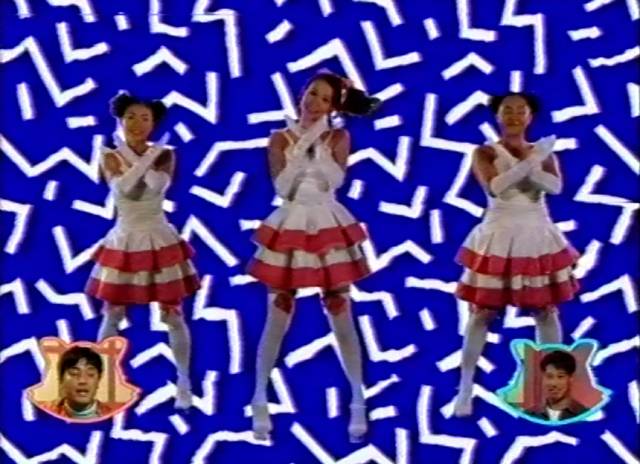
But something changes along the way and Top Knot Detective sneaks up on the audience with more substantial concerns. Interviews with cast and crew reveal details of Takamoto’s explosive personality, his paranoia and egotism, and escalating conflicts with Haruto Kioke (Masa Yamaguchi), the son of the head of the Sutaffu Corporation which finances the series, who is also cast as the hero’s nemesis Kurosaki. Their clashing personalities tear the show apart – there are additional tensions around co-star Mia Matsumoto (Mayu Iwasaki), who came to acting via pop stardom in a terrible girl group (another rather easy target) – and after the series devolves from an essentially straightforward samurai narrative into ever-wilder fantasy (robots, giant monsters, time travel), the head of Sutaffu (Shinichi Matsuda) is murdered and Takamoto disappears. At which point, the faux doc becomes an investigation into an unsolved crime and a quest to discover what happened to the vanished star. All the initial pop culture play turns out to be the absurd background for something darker and more serious; McCann and Pearce’s narrative sleight-of-hand has lulled the audience into expecting something easy and rather obvious before delivering a meditation on the power of celebrity and commerce to wreak havoc in those ill-equipped to deal with the pressures of a life lived in public.
The image on the Blu-ray is appropriately uneven – crisp interviews, with the show clips cropped and degraded to VHS dub quality – giving it extra layers of plausibility. There’s a director commentary, a long-form making-of and a couple featurettes, plus a soundtrack CD.
*
Arrow
Recent Arrow releases include major upgrades of titles I already owned.
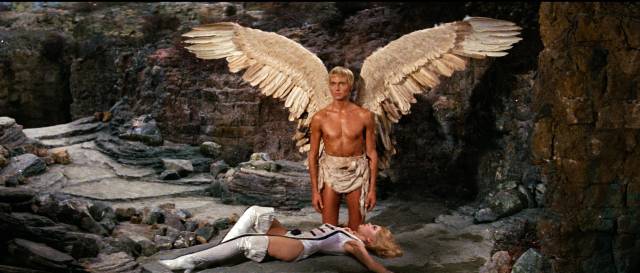
Barbarella (Roger Vadim, 1968)
Roger Vadim’s Barbarella (1968), always a fine piece of ’60s eye candy, looks quite spectacular in a new 4K restoration which makes the day-glo colours pop. The passage of time has made it increasingly unsettling to see Jane Fonda in her brief sex-kitten phase (she was treated similarly by then-husband Vadim in his segment of the same year’s Poe anthology, Spirits of the Dead). It’s even more surprising that this kinky (occasionally perverse) comic book adaptation, which begins with Fonda’s zero-G striptease under the titles, was made as she was about to become an outspoken and controversial political figure with her opposition to the Vietnam War. In Barbarella, as an agent of a government motivated by love (and sexual freedom), she is sent to deal with a scientist (Milo O’Shea) who has turned pleasure into a weapon of oppression. Her hedonistic innocence is more than enough to defeat evil. Mario Garbuglia’s production design and Claude Renoir’s cinematography make this one of the great pop-art comic book movies of the ’60s. The two-disk set includes a Tim Lucas commentary and, on the second disk, hours of interviews and featurettes. There’s also a 120-page book of essays and production art.
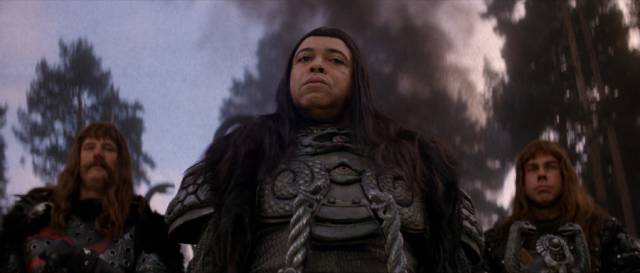
Conan the Barbarian (John Milius, 1982)
I’ve always been a bit ambivalent about John Milius’ Conan the Barbarian (1982), though I enjoy it now more than I did forty years ago. I think those initial feelings stemmed from the impression that Milius (and co-writer Oliver Stone) were treating Robert E. Howard’s pulp creation way too seriously. (I much preferred, and still do, Don Coscarelli’s The Beastmaster, released five months later, because it seems closer to the spirit of classic pulp fantasy; I also prefer Marcus Nispel’s 2011 remake, starring Jason Momoa.) But I did enjoy watching Milius’ film again in Arrow’s 4K restoration. Although here, early in his career, Arnold Schwarzenegger was more of a visual effect than an actor, he certainly looked the part and Milius props him up with an able supporting cast which includes Max von Sydow, James Earl Jones, William Smith, Mako and Sandahl Bergman. Episodic in structure – the opening sequence of the attack on the winter-shrouded village, where young Conan sees his father and mother killed by Thulsa Doom, establishes an epic tone which carries much of what follows even if there isn’t a great deal of narrative momentum – the movie remains a collection of moments rather than a fully engaging story.
The set includes three variant cuts – theatrical, international and extended – though the differences are minor. There are two commentary tracks (archival with Milius, new with publicist Paul M. Sammon), plus a second disk with hours of new and archival featurettes. And once again there’s a 120-page book of essays.
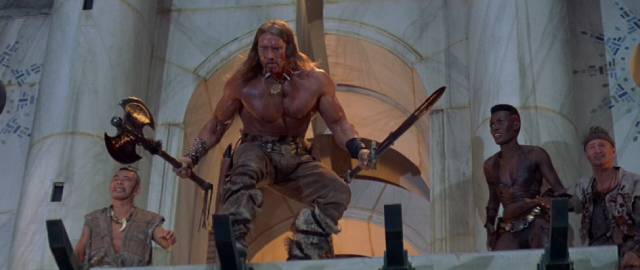
Conan the Destroyer (Richard Fleischer, 1984)
The box set also includes a 4k restoration of Richard Fleischer’s sequel, Conan the Destroyer (1984). Fleischer, an old studio journeyman, lacks Milius’ pretensions to grandeur and leans more into comedy with Tracey Walter’s sidekick and Grace Jones’ kick-ass Amazon. This comes much closer to an old-school peplum than the previous movie’s attempt at an epic saga, with somewhat cheesier production values (similar to Peter Yates’ Krull [1983]). Still, the cast is pretty good – Sarah Douglas imports her villainess from the Superman movies as the evil queen; Wilt Chamberlain provides an interesting visual contrast with Arnold as the queen’s chief henchman; Mako is back, and Jeff Corey and Ferdy Mayne show up in small roles, while Olivia d’Abo is a bit vacuous as the imperilled princess. The transfer is good, of course, and there are three archival and one new commentaries, plus a collection of new and archival featurettes.
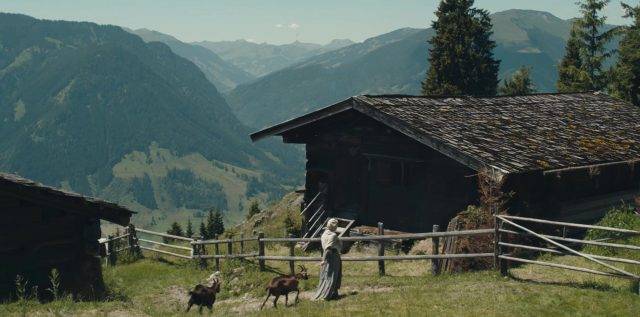
Hagazussa (Lukas Feigelfeld, 2017)
It appears that Germany has some impressive film schools. Like Tilman Singer’s Luz, Lukas Feigelfeld’s Hagazussa (2017) was a thesis project, made on an even more ambitious scale. Shot in remote mountains, in both winter and summer, with very little dialogue, the film is steeped in superstition; it’s the 15th Century and Christianity and paganism are inextricably mingled in this peasant society. In the wintry opening, a girl and her mother are menaced in their cabin by hostile villagers who believe the woman is a witch – and perhaps she is. Before long, the mother dies a horrible death from plague, leaving the girl to fend for herself. Years later, now a woman herself with a baby daughter of her own, Albrun (Aleksandra Cwen) lives a solitary life, milking her goats and gathering herbs. Like her mother, she is believed to be a witch, treated with distrust. When she briefly opens up to others, she’s betrayed and her goats killed. Gradually, she goes mad, killing her own child and (perhaps) infecting the village with plague (she places a dead rat at the source of the village’s water supply and pisses on the carcass in a kind of ritual). Like Robert Eggers’ The Witch (2015), Hagazussa feels like something made in another time, only partially comprehensible from our perspective, another culture viewed from the inside. Cwen gives a haunting performance and cinematographer Mariel Baqueiro provides striking landscape imagery, which gets an impressive presentation on the Blu-ray. There’s a commentary from Kat Ellinger, a select-scene commentary from Feigelfeld, a deleted scene and a one-hour student film, Beton (2011).
Comments
You’re bang on with the Hagazussa review. It’s one my fave horror films of the last decade. So beautifully shot. Gets better with repeat viewings.